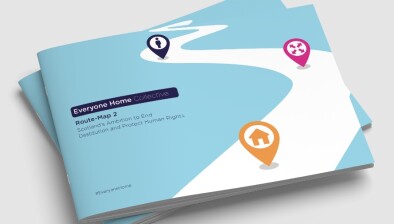Navigating the housing insecurity maze: Unraveling the impact of Universal Credit rollout

Iain Hardie explores the impact of the UK’s Universal Credit rollout on housing insecurity, examining research findings that suggest an increase in housing problems and approaches for assistance due to the policy implementation, as well as discussing the key aspects of Universal Credit that contribute to these issues and potential reforms that could mitigate housing insecurity for claimants.
Nearly a decade on from the start of its gradual (and much delayed) rollout, the UK’s move to Universal Credit is now due to be fully completed by 2024/25, after which most of the old ‘legacy benefits’ will no longer exist. As we approach the end of this long rollout period, with almost 6 million people already on Universal Credit, it is essential to look back at the impact of the reform on issues such as housing insecurity and what improvements can be made.
One way Universal Credit’s impacts to date can be assessed is by taking advantage of the staggered nature of its rollout, i.e. the fact that its ‘natural migration’ phase of rollout involved introducing Universal Credit ‘Full Service’ in different areas at different times. This means that local authority-level data on outcomes such as housing insecurity indicators can be tracked over time, before and after the policy rollout in each area, to measure its impact. This was the approach taken in my recently published paper in Social Policy & Administration, which examines the relationship between Universal Credit rollout and homelessness assistance needs within Scottish local authorities.
What are the impacts of the Universal Credit rollout on housing insecurity?
The research findings of this paper suggest that the Universal Credit rollout has been associated with a clear increase in the rates of households making ‘Housing Options’ approaches to their local authority due to housing problems (e.g. if they are at risk of homelessness). Specifically, UC ‘Full Service’ rollout was associated with an increase of 1.32 ‘Housing Options’ approaches (per 10,000 households) within Scottish local authorities between April 2014 and March 2019, which corresponds to around an 8% increase in ‘Housing Options’ approach rates during the initial pre-rollout period. Importantly, this impact tended to increase when Universal Credit rolled out for longer (and thus more people had moved onto it).
One positive finding was that there was no clear evidence that the Universal Credit rollout was associated with increased rates of working-age statutory homelessness claims, indicating even more severe housing insecurity than ‘Housing Options’ approaches. Nevertheless, the finding of increased ‘Housing Options’ approaches remains a concern, especially when this is considered alongside the findings of other previous similar research using English local authority level data, which has found Universal Credit ‘Full Service’ rollout to be associated with (a) increases in rates of people approaching Citizens Advice for help with rent arrears issues, and (b) increases in rates of landlord repossession actions made by landlords to evict tenants.
Which aspects of Universal Credit are most likely to impact housing insecurity, and what can be done about them?
Multiple aspects of Universal Credit can lead to hardship and housing problems among claimants, including issues during the initial transition onto Universal Credit and ongoing and cumulative issues as claimants remain on Universal Credit over time.
First, the long wait period (usually around five weeks) between making a Universal Credit claim and receiving the first payment can lead to housing problems during the initial transition onto Universal Credit, as those without savings to fall back on may struggle to avoid falling into rent arrears. The Department for Work and Pensions has attempted to address this by offering advance payments to those unable to manage financially during the waiting period. However, this only temporarily solves the issue as advance payments are effective loans that must be paid back over time.
Second, Universal Credit’s system of ‘ubiquitous conditionality’ and harsh sanctions for non-compliance with work-related conditions (an average sanction costs a Universal Credit claimant £660, and the total amount of money lost to claimants through sanctions is about £35million) can also cause housing problems. This is because the withdrawal of benefit income via sanctions can leave claimants without enough income to meet rent payments.
Third, and relatedly, under Universal Credit claimants are by default paid monthly in arrears with housing costs paid directly into their own bank account, whereas previous benefits tended to be paid more frequently and Housing Benefit was paid to landlords bank accounts. This can cause housing problems as it means claimants have to wait longer for payments and may ‘borrow’ money from the housing costs element of their Universal Credit income to pay for other essential costs (particularly when their Universal Credit standard allowance payment is reduced due to sanctions or other deductions). However, it should be noted that safeguards like Alternative Payment Arrangements (and Universal Credit “Scottish Choices” in Scotland) are now in place to help protect against this issue, and there is some evidence that these have, to some extent, helped to alleviate housing insecurity.
Finally, another key factor determining the housing security of Universal Credit claimants is the actual value of Universal Credit payments. Research conducted during the COVID-19 pandemic, when the standard allowance was temporarily uplifted by £20 per week, suggests that even with that uplift, the actual value of Universal Credit payments was still not adequate as many claimants were still experiencing financial difficulties and falling behind with their housing costs.
These issues highlight the likely reasons that the Universal Credit rollout has been associated with increased housing insecurity. In the future, as we approach the final stages of its rollout, reforms to Universal Credit, such as: (a) addressing the five-week wait by making advance payments available to all claimants and making them non-repayable, (b) significantly reducing the severity of sanctions and conditionality, (c) ensuring Alternative Payment Arrangements are available to all claimants who may benefit from them, and (d) uplifting the value of Universal Credit’s standard allowance, would all likely help protect the housing security of claimants.
- Iain Hardie is a postdoctoral research assistant in the Department of Psychology, School of Philosophy, Psychology and Language Sciences, University of Edinburgh. You can read Iain’s paper here.
This article was originally published on the CaCHE website.








